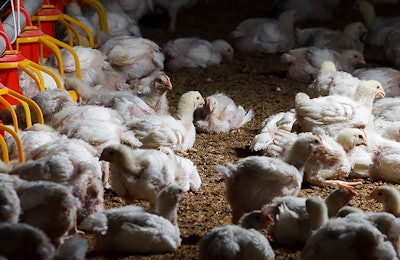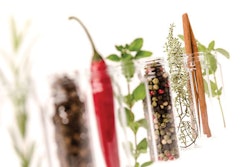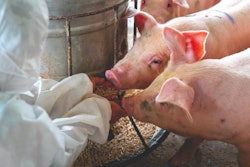
Poultry fed antibodies enjoy stronger immune response, gain more weight in university trial
Antibodies, fed alongside other supplements, may help bolster the immune system and promote greater animal performance, according to new poultry research from the University of Illinois.
According to the study, birds infected with Eimeria — the parasite responsible for causing coccidiosis — gained more weight when an IL-10 neutralizing antibody was included in their diet, although the antibody supplement did not necessarily reduce the severity of the parasitic infection.
Although this specific antibody treatment is specific to coccidiosis, the idea could be adapted to improve health outcomes tied to a variety of conditions, according to Ryan Dilger, an associate professor in the University of Illinois’ Department of Animal Science. The feed additive they tested, he said, is not entirely unlike the antibody cocktails currently used to treat COVID-19 in humans. The technology needed to create new antibody-based supplements and treatments has been available since the 1980s, and the IL-10 supplement has already been licensed for commercial distribution.
“From my viewpoint, this [study] is a proof-of-concept piece,” Dilger said. “This is one of the first to be commercialized that uses an oral antibody mechanism. There is wide potential.”
The notion of using antibodies as an animal feed additive to support immune function began with the work of the late Mark Cook, a professor of animal sciences at the University of Wisconsin-Madison. Cook conducted research into the life cycle of parasitic protozoa such as those that cause coccidiosis, and was particularly interested in how Eimeria disrupted the immune system of poultry, according to Dilger.
Cook’s work demonstrated that Eimeria uses antibodies to “trick” the bird’s immune system into under-reacting to the parasite’s presence. He hypothesized that this trickery could be overcome by supplementing the birds’ feed with antibodies, and his students went on to continue his work after Cook died in 2017.
Using an antibody to trigger a protective immune response is somewhat similar to vaccination, but where a vaccine teaches the immune system to produce a needed antibody continuously, providing the antibody directly does not result in a long-term effect — antibodies added to feed wear off after a time.
Exactly how producers might incorporate an antibody-based feed additive depends on each farm’s processes, Dilger said. If farmers know coccidiosis is a problem during a particular time of year, they might want to feed the antibody seasonally. Others might opt to include the antibody consistently in the diet, depending on how often the pathogen is present and what it costs to purchase the additive.
But one question that remains, Dilger said, is whether pathogens develop resistance to the antibody additives in a similar fashion as has happened with antibiotics.
“It is possible there could be the evolution of a pathogen around a technology like this antibody, which is why coccidiosis is a classic example,” Dilger said. “We would use anticoccidials, but over time an area would become resistant to them and you would switch to a different area.”
Given this possibility, Dilger said the additive technology should be seen not as a cure-all but as “nutritional tool in the toolbox” to be used alongside other solutions.













